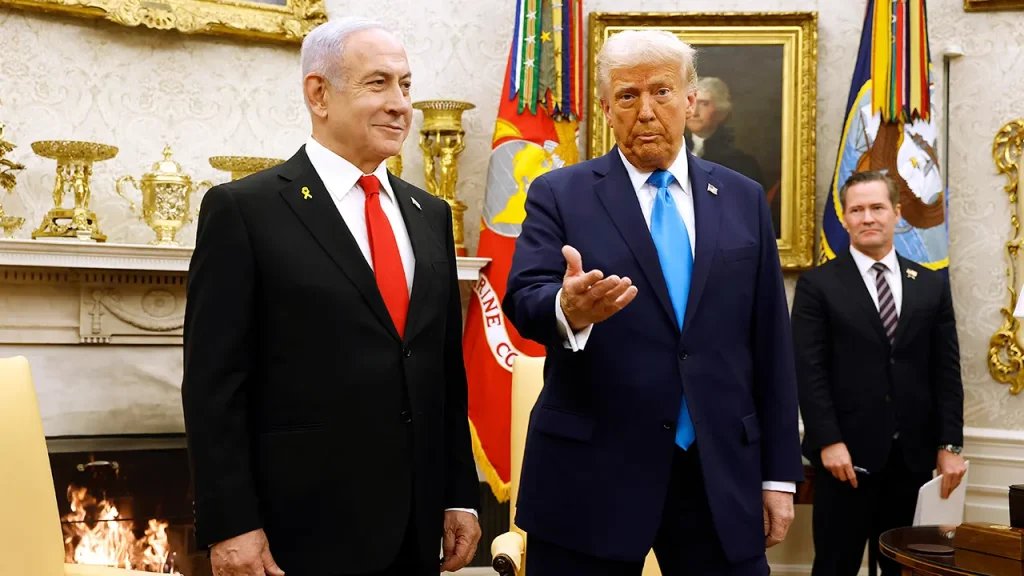This week, President Donald Trump is expected to address the implications of his recently announced tariffs amid rising concerns about their economic impact. As part of his administration’s ongoing efforts to revamp trade policies, Trump contends that these tariffs will empower the U.S. economy, though critics warn of potential harm to American families. Additionally, Trump will host Israeli Prime Minister Benjamin Netanyahu at the White House to discuss trade and pressing geopolitical issues.
| Article Subheadings |
|---|
| 1) Overview of New Tariffs and Economic Challenges |
| 2) Legislative Responses and Political Reactions |
| 3) Trump’s Assurance and Future Plans |
| 4) Meeting with Netanyahu and Geopolitical Implications |
| 5) Summary of Congressional Actions and Outlook |
Overview of New Tariffs and Economic Challenges
President Trump’s recent announcement of tariffs targeted at numerous countries has ignited considerable debate among economists and policymakers. The tariffs are aimed at several key sectors and are seen as part of Trump’s broader “economic revolution,” which he believes will catalyze significant economic growth. On social media, Trump urged his supporters to “HANG TOUGH,” emphasizing that, despite challenges, the long-term benefits of these tariffs would be transformative for the U.S. economy. However, the immediate backlash has raised alarms, with notable indexes such as the S&P 500 and Nasdaq experiencing substantial declines. The Dow Jones Industrial Average, in particular, plummeted by 2,231.07 points, reflecting growing fears about the sustainability of Trump’s economic strategies.
Legislative Responses and Political Reactions
In the wake of these tariff announcements, political leaders have weighed in on their potential implications. Senate Minority Leader Chuck Schumer characterized the tariffs as a “massive assault on American families” during a televised interview, arguing that they might disproportionately benefit affluent individuals while imposing burdens on the average worker. Schumer’s remarks highlight the growing concern among Democrats about the economic inequities that could stem from such policies. Furthermore, some conservative factions have also voiced discontent, with legal challenges already emerging against certain tariffs, particularly those impacting China. These tensions are indicative of a broader divide within political circles regarding trade policies and their effects on the American economy.
Trump’s Assurance and Future Plans
Despite the mounting criticism, President Trump remains steadfast in his belief that the tariffs will ultimately benefit the U.S. economy. On social media, he claimed that the administration is witnessing unprecedented job creation and investment, boasting about more than $5 trillion worth of investments flowing into the economy. His characterization of the situation is one of optimism, asserting that this is not just a policy shift but a revolution aimed at restoring American economic prowess. As the administration prepares for the days ahead, Trump plans to firmly advocate for his tariff strategy, reiterating that short-term volatility is part of the broader resurgence he aims to achieve through his economic policies.
Meeting with Netanyahu and Geopolitical Implications
Amid these domestic challenges, President Trump has scheduled a high-profile meeting with Israeli Prime Minister Benjamin Netanyahu, set to take place on Monday. This meeting will serve dual purposes: to discuss the implications of the recently imposed 17% tariff on Israel and to address ongoing geopolitical issues, including the controversial Israeli invasion of Gaza. The dynamics of U.S.-Israel relations, particularly regarding trade policies and military collaboration, are under scrutiny as both leaders aim to navigate these complexities. Analysts are keen on observing how Trump’s trade stance influences diplomatic ties, especially in a region fraught with conflict and strategic importance.
Summary of Congressional Actions and Outlook
In parallel with the tariff discussions, the Senate successfully adopted Trump’s budget blueprint over the weekend. However, this measure now requires the House’s approval to advance to the budget reconciliation process. The outlook in the House appears contentious as GOP lawmakers exhibit divides over specific elements of Trump’s fiscal agenda. Representative Andy Harris, the chair of the House Freedom Caucus, expressed reservations about advancing the budget resolution without a clear understanding of the details regarding spending and deficit reduction. This apprehension reveals the challenges Trump may face in pushing through his wider agenda following the tumultuous introduction of the tariffs.
| No. | Key Points |
|---|---|
| 1 | President Trump announces new tariffs aimed at boosting the U.S. economy. |
| 2 | Concerns arise as major stock indexes experience significant declines. |
| 3 | Political leaders express mixed reactions, with warnings about the impact on American families. |
| 4 | Legal challenges to Trump’s tariffs emerge from conservative groups. |
| 5 | Trump’s upcoming meeting with Netanyahu will address trade and geopolitical issues. |
Summary
The upcoming week poses significant challenges for President Trump as he navigates the repercussions of his newly introduced tariffs. While the president remains optimistic about the economic benefits these policies will yield, skepticism persists among lawmakers and economists about the potential repercussions on American households. As discussions with Benjamin Netanyahu unfold, the international ramifications of Trump’s policies will also come into focus. Ultimately, this week will prove critical in shaping not only Trump’s legislative agenda but also the broader trajectory of U.S. economic and foreign relations.
Frequently Asked Questions
Question: What are the main objectives of Trump’s new tariffs?
The primary objective of Trump’s new tariffs is to protect domestic industries by imposing additional costs on imported goods, thus encouraging American production and job creation.
Question: How have financial markets reacted to the announcement of tariffs?
Following the announcement, major financial markets like the S&P 500 and Nasdaq experienced significant declines, indicating investor uncertainty regarding the potential economic impact of these tariffs.
Question: What potential challenges does Trump face in advancing his budget blueprint?
Trump faces challenges in advancing his budget blueprint due to divisions within the GOP in the House, where members have expressed hesitation about supporting the plan without a clearer understanding of spending and deficit reduction measures.



